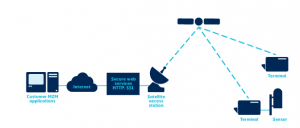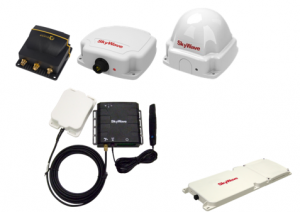About
IsatData Pro (IDP) is a global L-band satellite network service optimized for Machine-to-Machine (M2M) and Internet of Things (IoT) applications. IsatData Pro is intended for event-driven data collection and remote control, but also enables applications such as forms and text messaging through Human-Machine Interfaces. Typical applications include tracking, fleet management, security, remote monitoring, telematics and SCADA.
Network
Please click here and select Coverage for an IDP coverage map.

Hardware
Terminals
Terminals, or mobiles, are the physical units that provide the communication link to the remote assets or sensors within the IsatData Pro system. A range of modem and terminal configurations leveraging IsatData Pro are available from various manufacturers. Modems are generally embedded within Original Equipment Manufacturer (OEM) systems, while terminals generally provide a generic packaged communications capability for a variety of applications.

A terminal, or more specifically the Mobile ID of the terminal, needs to be activated before the terminal can be communicated with. Activation of a Mobile ID can be performed by an IDP Distribution Partner, using the IDP administration APIs or the IDP Administration portal. While specific functionality of a terminal is defined by the manufacturer, a standardized message set is defined to remotely control core functions for all type-approved terminals. These core modem messages provide common methods to query and configure terminals on the network. Most IsatData Pro solutions involve some level of data manipulation within or associated with a terminal; often this takes the form of an embedded application. The respective manufacturers and their development partners provide more detail on such solutions.
Services Supported
IsatData Pro offers two-way, fully acknowledged messaging communications operating at a low data rate. Most applications make use of event-driven data with near-real time alert delivery, but the system can also scale to support larger messages with a modest throughput of approximately 150 bits per second. The system uses minimal overhead and includes acknowledgments, so customers pay only for delivered payload data.